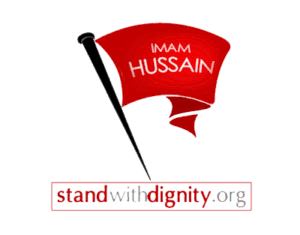By Mr. A.A. Haidari
The, calamity of Karbala’ is unique in the annals of the world’s calamities. No other tragic event in human history has soared so high and penetrated so deep as that which the burning sun of Arabia witnessed on that fatal day of ‘Ashura’ in which the sublime manifestation of total submission to the will of God and the blinding light of pure love illuminated a world which had been overcome by darkness. God in His wisdom willed, once and for all, the triumph of love. The most eloquent expression of love emerges from martyrdom, but the meaning of martyrdom requires elucidation.
There have been many martyrs in the course of history, and their martyrdom has varied in its extent and intensity. The concept itself is infrequently misunderstood and has been deliberately misused in pursuit of glory and worldly gains. Old-fashioned patriotism closely followed by nationalism and in modern times, the emergence of socialism and communism, has more or less replaced the worship of God. Hence, he who is prepared to give his life to protect his country, nation or creed is considered no less of a martyr than, say, a Saint Peter. But there is a world of difference between the two.
The true martyr is someone who has become the instrument of God. Who has lost his own Will in the will of God, and who, in the worlds of T.S.Eliot, ‘no longer desires anything for himself, not even the glory of being a martyr’. In other worlds, in contrast to accidental death on the path of profane glory, true martyrdom is never an accident. It is always an act of will on the part of the martyr-to-be, preceded by a call from the Almighty.
The unshakeable faith of Imam Hussain against all odds, and his uncompromising stand vis-à-vis the forces of tyranny, is living proof of the triumphant spirit of a free man who chooses to give his life freely to save his umma from bondage. Here is a man who accepts all trials and tribulations and does not falter for a moment is his perseverance to follow his chosen path. Being Imam Hussain, of course, he could not do otherwise. A lesser man, just as devout, could retire to a life of devotional practices and wash his hands of commitments incumbent on him. But not he. He was standing at the threshold of a new era and did what he had to do in order to save Islam from the un-Islamic course adopted and promoted by a new Caliph, the so-called ‘Amiral-Mu’minin’. Who did not even bother to keep up the appearance of devotion?
Yazid, a pleasure-loving man, a poet of romantic verse, and a hunter in search of excitement, was, like his grandfather, closely attended to pre-Islamic values and practices. In fact, he was a kind of playboy who had been groomed by his scheming father to succeed him and undermine the religion of Islam just as his grandfather Abu Sufyan had tried, but failed,to do when he opposed the Prophet. The ascent to the pulpit of the Prophet by a man of such a background was a clear indication of how low the society had sunk-they did not dispute his claim to be ‘Amiral-Mu’minin’ but readily accepted him as such’.
In utter contrast stands Imam Hussain. Who was born to Islam, and whose faith had been nurtured from birth by a father like ‘Ali and a grandfather like the Prophet. Since Fatima was his mother, it goes without saying that the infant Hussain had the privilege and honor of being nourished literally in the cradle of Islam. All these blessing, and his inborn qualities, made him the man he was. With his roots deep in Islam, sustained by spiritual nourishment. Hussain flourished and grew in stature to become, as it were, a magnificent deep-rooted tree which no force, however strong,could uproot. Upon Imam Hussain fell the sole responsibility of saving Islam from corrupt influences and restoring the religion to its proper path. When people failed to appreciate the immense gravity of the situation, Imam Hussain had to voice his thunderous protest loudly enough to be heard by all, and leave no excuse for the faint-hearted to claim that they had not been warned. But the grip of the regime was so tight,and the morale of the people so low, that despite an initial, favorable response to his call, before long his words were falling on deaf ears. This did not deter the Imam in the least and like his father and grandfather before him; he never hesitated to uphold the truth, no matter what the consequences. So it was. The thorny path of truth was there. The Imam took it, and from that moment on, there was no looking back. He cheerfully bore all manner of suffering in order to fulfill his obligation to his Creator and to attain eternal joy. His task was to pave the way for his followers and to teach them that ultimate joy comes only through suffering. The path of salvation is not a smooth path. Imam Hussain was undoubtedly a man of destiny who was destined to enter the field of historical events and by his shine example shed light on the obscure corners of human potential,. No other man has stood his ground so firmly and sacrificed so much to preserve the sanctity of his belief. More than any other Muslim, he represents not only the spiritual aspects of Islam, but also all its other dimensions. By his unique stand, he made it clear that in the darkest hour there is no room for despair and the spirit of man remains unconquered, come what may. Through his own life and death he has taught us how to live and how to die. Few of us are capable of following his example, even remotely. Nevertheless, even to follow him inadequately is a great achievement. It is not enough to mourn Hussain’s martyrdom and curse his enemies, but it is also essential to try and understand what he stood for. He drew his sword to cut at the root of despotism. He rose and shed his blood to revitalize the religion of Islam as he knew it.
This is situation: With the rise of Muawiyah, the oligarchic rule of heathen times has been revived. Muawiyah designates his son Yazid as his of successor. Yazid demands an allegiance from all Muslims. Those who do not offer it voluntarily are bribed or made to do so under duress. The smallminority that refuses to submit is led by Imam Hussain who is fully aware of his historical mission. He is certain that submission to the will of Yazid is tantamount to the end of Islam as he knows it. The Imam leaves Medina for Mecca and prolongs his stay for hajj. But Yazid has made plans to have him assassinated there quietly. Imam has, therefore, to forego hajj and instead performs umra and leaves Mecca for Iraq. He crosses the Arabian Desert accompanied by a few devoted followers, his family and close kinsmen. He encamps at a place called Karbala, near the west bank of the Euphrates, on the 2nd of Muharram, 61A.H.
It is impossible to depict the scenes of Karbala’. No matter how sensitive one’s imagination, it falls short of visualizing a true picture of the battlefield. How can the contrast of good and evil, love and hatred, be portrayed faithfully? Only God knows what went on in the heart and mind of the Imam during those seven fateful days. His super-human forbearance, his astonishing composure, his majestic bearing, his spiritual strength, his human sentiments, his moral courage and finally, when the moment of truth came, his unrivalled bravery, remain unsurpassed. The true nature of the great sacrifice offered by Imam Hussain and those happy few, whose blood mingled with the blood of the Master, shall remain inscribed in letters of blood on the Table of Time. In the words of Iqbal:
He was the one who (by his martyrdom) infused faith in the hearts of unbelievers.
The earth trembled while he lay prostrate in prayers to Allah.
He was the one who proclaimed. ‘There is no God but God’. While his head was being severed by a sword.
From his blood springs forth the belief that there is no God but Allah.











